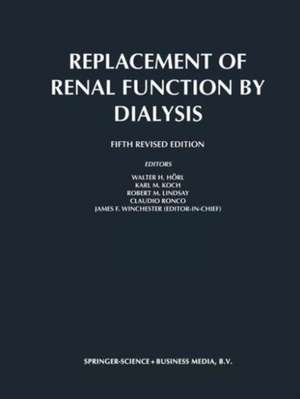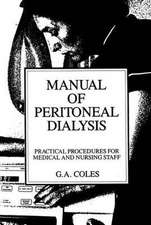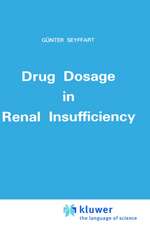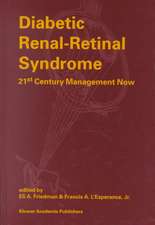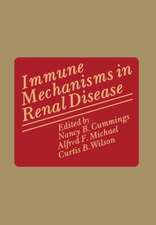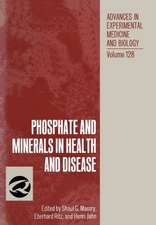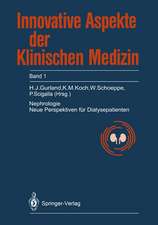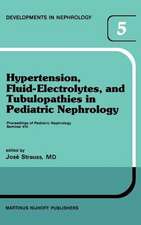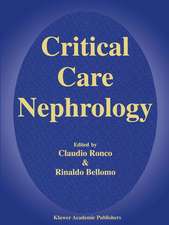Replacement of Renal Function by Dialysis
Editat de Walter H. Hörl, Karl-Martin Koch, Robert M. Lindsay, C. Ronco, J.F. Winchesteren Limba Engleză Paperback – 23 aug 2014
Considered the global resource for dialysis specialists, dialysis manufacturers and scientists for over two decades, this authoritative, highly acclaimed major reference work has been completely rewritten and revised in a much-awaited 5th edition. All previous chapters have been updated to include the very latest advancements and understandings in this critical and complex field. New sections include those on computerization of dialysis records, online monitoring and biofeedback, patient sexual function, patient selection and integration, use of exercise in improving patient health, design of randomized trials, and more. This new edition is truly global in scope and features the contributions the top experts from around the world.
Preț: 869.22 lei
Preț vechi: 914.97 lei
-5% Nou
Puncte Express: 1304
Preț estimativ în valută:
166.32€ • 174.12$ • 137.62£
166.32€ • 174.12$ • 137.62£
Carte tipărită la comandă
Livrare economică 01-07 aprilie
Preluare comenzi: 021 569.72.76
Specificații
ISBN-13: 9789401570121
ISBN-10: 9401570124
Pagini: 1676
Ilustrații: LXIII, 1604 p. In 3 volumes, not available separately.
Dimensiuni: 210 x 279 x 99 mm
Greutate: 4.04 kg
Ediția:5th ed. 2004. Softcover reprint of the original 5th ed. 2004
Editura: SPRINGER NETHERLANDS
Colecția Springer
Locul publicării:Dordrecht, Netherlands
ISBN-10: 9401570124
Pagini: 1676
Ilustrații: LXIII, 1604 p. In 3 volumes, not available separately.
Dimensiuni: 210 x 279 x 99 mm
Greutate: 4.04 kg
Ediția:5th ed. 2004. Softcover reprint of the original 5th ed. 2004
Editura: SPRINGER NETHERLANDS
Colecția Springer
Locul publicării:Dordrecht, Netherlands
Public țintă
ResearchCuprins
Section 1: Pathophysiology of the uremic syndrome.- 1. Molecular genetic basis of uremia.- 2. Uremic toxicity.- 3. The uremic syndrome and pathophysiology of chronic renal failure.- 4. Solute transport mechanisms in dialysis.- 5. Optimization of high-flux, hollow-fiber artificial kidneys.- 6. Peritoneal anatomy and physiology during peritoneal dialysis.- 7. The biology of hemodialysis.- 8. Pathophysiology of acute renal failure.- Section 2: Technology of dialysis and associated methods.- 9. Vascular access for hemodialysis.- 10. Peritoneal access and its complications.- 11. Thrombogenesis and anticoagulation in patients undergoing chronic hemodialysis.- 12. Hemodialyzers and related devices.- 13. Membranes for hemodialysis.- 14. Hemodialysis machines and monitors.- 15. Machines for automated peritoneal dialysis.- 16. Machines for continuous renal replacement therapies.- 17. Water treatment for contemporary hemodialysis.- 18. Solutions for peritoneal dialysis.- 19. Computerized patient record in dialysis practice.- 20. Online monitoring and feedback-control.- 21. Hemodialysis fluid composition.- 22. Adequacy of hemodialysis.- 23. Adequate peritoneal dialysis.- 24A. Dialysis techniques: peritoneal dialysis.- 24B. Dialysis techniques: hemodialysis.- 24C. Dialysis techniques: continuous renal replacement techniques.- 24D. Dialysis techniques: therapeutic plasma exchange and related techniques.- 24E. Dialysis techniques: hemoperfusion.- Section 3: Clinical aspects of organ failure in dialysis patients.- 25. Blood pressure control in chronic hemodialysis patients.- 26. Cardiac disease in chronic uremia.- 27. Lipids and atherosclerosis.- 27A. Homocysteine and atherosclerosis in dialysis patients.- 28. Acid—base in dialysis.- 29. Pulmonary aspects of dialysis patients.- 30.Gastrointestinal complications in dialysis patients.- 31. Neurological and neuromuscular disorders in dialysis patients.- 32. Trace elements in dialysis patients.- 33. Bleeding disorders in renal failure.- 34. Management of anemia in patients with chronic kidney disease.- 35. Impaired cellular host defense and chronic inflammatory abnormalities in end-stage renal disease.- 36. Diseases of the native kidneys in dialysis and transplanted patients.- 37. Endocrine function in uremia.- 38. Malnutrition and dialysis.- 39. Beta-2-microglobulin amyloidosis.- 40. Renal osteodystrophy.- 41. Intradialytic complications: pathophysiology, prevention and treatment.- 42. Peritoneal infections, hernias and related complications.- Section 4: Special clinical situations.- 43. Preservation of native renal function at different stages of renal impairment.- 44. Considerations in the management of patients with acute renal failure.- 45. Renal replacement therapy in children.- 46. Dialysis in the elderly.- 47. Pregnancy and dialysis.- 48. Renal replacement therapy for diabetic patients.- 49. Social, ethical and legal issues in chronic hemodialysis and transplantation.- 50. Psychiatric aspects of the dialysis patient.- 51. Quality of life of the dialysis patient.- 52. Sexual dysfunction in the dialysis patient.- 53. Transplantation: integration, patient selection, use of dialysis in transplant patients.- 54. Human immunodeficiency virus infection in patients with end-stage renal disease.- 55. Viral hepatitis in dialysis patients.- Section 5: Organization and results of chronic dialysis.- 56. Outcomes in dialysis: a global assessment.- 57. Economics in dialysis.- 58. Dialysis in the developing world.- 59. Exercise for dialysis patients.- 60. Assessing the progression of renal disease.- 61. Thedesign of randomized clinical trials in dialysis patients.- 62. Management of center hemodialysis programs.- 63. Home hemodialysis.- 64. Peritoneal dialysis program management.- 65A. Telemedicine and dialysis: the desk-top model.- 65B. General telemedicine systems.
Recenzii
`The standard reference book for the artificial kidney world.'
JAMA
`The aim of the authors - to produce a standard text for nephrologists and those with an interest in today's treatment of renal failure - is fully achieved.'
Urological Research
`A superb book ... the detail and depth of discussions are unequalled in any current nephrology text.'
Mayo Clinic Proceedings
JAMA
`The aim of the authors - to produce a standard text for nephrologists and those with an interest in today's treatment of renal failure - is fully achieved.'
Urological Research
`A superb book ... the detail and depth of discussions are unequalled in any current nephrology text.'
Mayo Clinic Proceedings
Caracteristici
Includes supplementary material: sn.pub/extras
